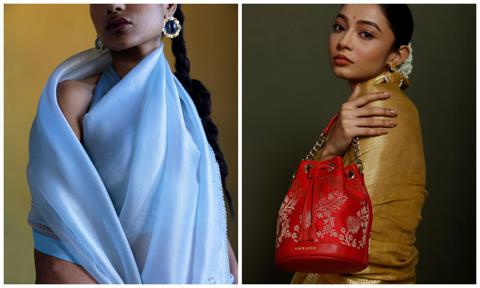
National Handloom Day: 7 Homegrown Labels To Shop From

India has a rich history of weaving and handloom techniques, along with a community that has worked tirelessly through generations to preserve these ancient art forms. In fact, the second-largest employment sector in the country after agriculture is handloom. A different technique and style of weaves and handlooms originates from different parts of the country, and each of them hold a significant place in the culture it originated within. And we’re sure that your wardrobe also features at least one or two handloom items that you inherited from your family.
Despite all this, artisans and craftspeople are striving hard to keep the art form alive. Factors like the boom of the fast fashion industry and then the pandemic have made it even more difficult for artisans to reach Indian consumers easily. For this reason, in 2015, August 7 was declared as National Handlooms Day to promote the interests of this large community, under Prime Minister Narendra Modi’s Vocal For Local agenda.
Over the years, there has been an emergence of labels that are championing handlooms. Designers like Anavila and Vaishali S are making hand-woven fabrics embellished with their contemporary designs that are accessible to mindful consumers. Along with these labels, there are many in the country who are promoting different weaving techniques of India and bringing them forward with their modern creations. No longer is handloom only associated with your grandmother’s saris or your father’s kurta collection.
Indian Designers and Labels That Are Modernising Handloom
This National Handloom Day, we decided to round up some of our favourite homegrown labels that are making handlooms cool again…

Naushad Ali
Naushad Ali
Taking inspiration from Pondicherry, which is an amalgamation of Tamil and French influences according to the designer, the label creates gender-fluid separates and other modern dressing options with hand-woven fabrics. The label works with clusters around the country, including West Bengal, Kanchipuram, Madurai, Jaipur, Kachchh, and Pochampalli.

Tui Tui
Tui Tui
On a serendipitous night in their apartment in New York City, Sakshi Shah and Kavya Khanna got the idea to start a label that could be a sustainable alternative to fast fashion labels in India. This is how Tui Tui came into existence. The label offers a contemporary spin on traditional handlooms with its day-to-day options, including pleated pants, crop tops, skirts, and more.

Kiniho
Kiniho
Meghalaya-based textile designer Iba Mallai combined her love for nature and her heritage pride to create her label, Kiniho. The designer only works with Eri silk, which is also known as ‘Peace silk’ since it doesn’t require the silkworms to be killed during the process of obtaining the fibre. The fibre is handwoven by local community weavers to create the textiles that make Kiniho’s sustainable and intensely wearable collections. The label also uses only natural dyes in its production processes, making its clothes easy on the skin and the environment.

Tan & Loom
Tan and Loom
Rukmini Guha combined her knowledge of prior experience in the leather industry along with the varied handlooms of India for her label, Tan and Loom. The premium leather bag label strives to support local artisans and craftsmen and promote slow fashion by focusing on producing only a limited number of bags to give them space to work on their artform and avoid wastage due to surplus production.

Johargram
Johargram
During the pandemic, Ashish Stayavrat Sahu got a chance to work closely with the weavers of Maher community from Simdega and Jharkhand. He conceptualised the brand Johargram. The label creates sustainable streetwear in earthy hues and highlights the rich cultural heritage of the state with each collection.

Mati
Mati
Fatima Punjaabi’s Mati is all about organic and sustainable clothing that looks uber cool and stylish. The label sources premium quality khadi from the weavers of West Bengal and explores new dyeing techniques and colour palettes with every collection.

Injiri
Injiri
Chinar Farooqui wanted to highlight India’s long-forgotten weaves and bring attention to how relevant these techniques are even today with the label ‘Injiri’, which historically stands for ‘Madras-checkered weave’. The label works closely with master weavers around the country to bring forth clothes that are not only stylish but also carry a story that’s unique to them.









